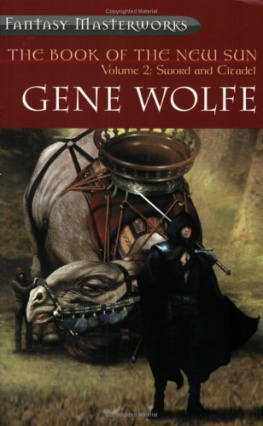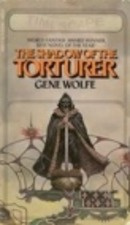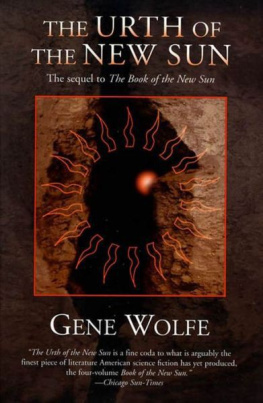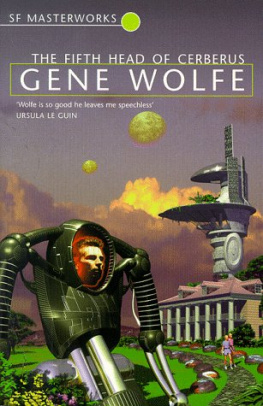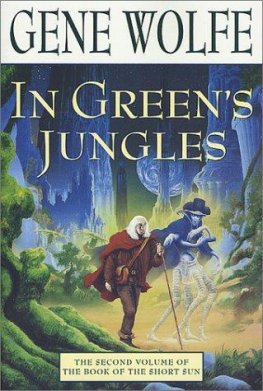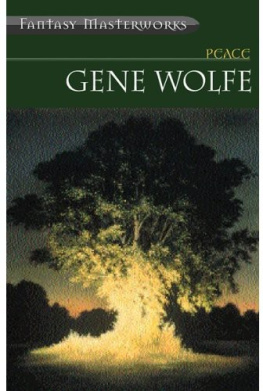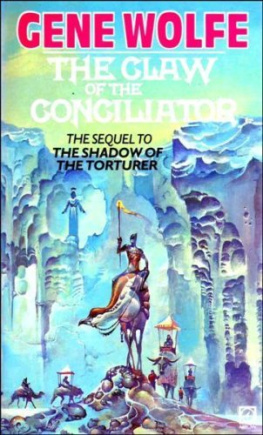Gene Wolfe - The Book Of The New Sun: Volume 2: Sword and Citadel (Fantasy Masterworks 12)
Here you can read online Gene Wolfe - The Book Of The New Sun: Volume 2: Sword and Citadel (Fantasy Masterworks 12) full text of the book (entire story) in english for free. Download pdf and epub, get meaning, cover and reviews about this ebook. year: 2000, publisher: Gollancz, genre: Art. Description of the work, (preface) as well as reviews are available. Best literature library LitArk.com created for fans of good reading and offers a wide selection of genres:
Romance novel
Science fiction
Adventure
Detective
Science
History
Home and family
Prose
Art
Politics
Computer
Non-fiction
Religion
Business
Children
Humor
Choose a favorite category and find really read worthwhile books. Enjoy immersion in the world of imagination, feel the emotions of the characters or learn something new for yourself, make an fascinating discovery.
- Book:The Book Of The New Sun: Volume 2: Sword and Citadel (Fantasy Masterworks 12)
- Author:
- Publisher:Gollancz
- Genre:
- Year:2000
- Rating:4 / 5
- Favourites:Add to favourites
- Your mark:
- 80
- 1
- 2
- 3
- 4
- 5
The Book Of The New Sun: Volume 2: Sword and Citadel (Fantasy Masterworks 12): summary, description and annotation
We offer to read an annotation, description, summary or preface (depends on what the author of the book "The Book Of The New Sun: Volume 2: Sword and Citadel (Fantasy Masterworks 12)" wrote himself). If you haven't found the necessary information about the book — write in the comments, we will try to find it.
The Book Of The New Sun: Volume 2: Sword and Citadel (Fantasy Masterworks 12) — read online for free the complete book (whole text) full work
Below is the text of the book, divided by pages. System saving the place of the last page read, allows you to conveniently read the book "The Book Of The New Sun: Volume 2: Sword and Citadel (Fantasy Masterworks 12)" online for free, without having to search again every time where you left off. Put a bookmark, and you can go to the page where you finished reading at any time.
Font size:
Interval:
Bookmark:
A Note on Provincial Administration
SEVERIAN'S BRIEF RECORD of his career in Thrax is the best (though not the only) evidence we have concerning the business of government in the age of the Commonwealth, as it is carried out beyond the shining corridors of the House Absolute and the teeming streets of Nessus. Clearly, our own distinctions between the legislative, executive, and judicial branches do not applyno doubt administrators like Abdiesus would laugh at our notion that laws should be made by one set of people, put into effect by a second, and judged by a third. They would consider such a system unworkable, as indeed it is proving to be.
At the period of the manuscripts, archons and tetrarchs are appointed by the Autarch, who as the representative of the people has all power in his hands. (See, however, Famulimus's remark on this topic to Severian.) These officials are expected to enforce the commands of the Autarch and to administer justice in accordance with the received usages of the populations they govern. They are also empowered to make local lawsvalid only over the area governed by the lawmaker and only during his term of officeand to enforce them with the threat of death. In Thrax, as well as in the House Absolute and the Citadel, imprisonment for a fixed term our own most common punishmentseems unknown. Prisoners in the Vincula are held awaiting torture or execution, or as hostages for the good behavior of their friends and relatives. As the manuscript clearly shows, the supervision of the Vincula ("the house of chains") is only one of the duties of the lictor ("he who binds"). This officer is the chief subordinate of the archon involved with the administration of criminal justice. On certain ceremonial occasions he walks before his master bearing a naked sword, a potent reminder of the archon's authority. During sessions of the archon's court (as Severian complains) he is required to stand at the left of the bench. Executions and other major acts of judicial punishment are personally performed by him, and he supervises the activities of the clavigers ("those with keys"). These clavigers are not only the guards of the Vincula; they act also as a detective police, a function made easier by their opportunities for extorting information from their prisoners. The keys they bear seem sufficiently large to be used as bludgeons, and are thus their weapons as well as their tools and their emblems of authority. The dimarchi ("those who fight in two ways") are the archon's uniformed police as well as his troops. However, their title does not appear to refer to this dual function, but to equipment and training that permits them to act as cavalry or infantry as the need arises. Their ranks appear to be filled by professional soldiers, veterans of the campaigns in the north and nonnatives of the area. Thrax itself is clearly a fortress city. Such a place could scarcely be expected to stand for more than a day at most against the Ascian enemyrather, it seems designed to fend off raids by brigands and rebellions by the local exultants and armigers. (Cyriaca's husband, who would have been a person almost beneath notice in the House Absolute, is clearly of some importance, and even some danger, in the neighborhood of Thrax.) Although the exultants and armigers seem to be forbidden private armies, there appears little doubt that many of their followers, though called huntsmen, stewards, and the like, are fundamentally fighting men. They are presumably essential to protect the villas from marauders and to collect rents, but in the event of civil unrest they would be a potent source of danger to such as Abdiesus. The fortified city straddling the headwaters of the river would give him an almost irresistible advantage in any such conflict. The route chosen by Severian for his escape indicates how closely egress from the city could be controlled. The archon's own fortress, Acies Castle ("the armed camp of the point"), guards the northern end of the valley. It appears to be entirely separate from his palace in the city proper. The southern end is closed by the Capulus ("the sword haft"), apparently an elaborate fortified wall, a scaled-down imitation of the Wall of Nessus. Even the cliff tops are protected by forts linked by walls. Possessing, as it does, an inexhaustible supply of fresh water, the city appears capable of withstanding a protracted siege by any force not provided with heavy armament. G.W.
Gene Wolfe was born in New York City and raised in Houston, Texas. He spent two and a half years at Texas A&M, then dropped out and was drafted. As a private in the Seventh Division during the Korean War, he was awarded the Combat Infantry Badge. The GI Bill permitted him to attend the University of Houston after the war, where he earned a degree in Mechanical Engineering. He is currently a senior editor on the staff of Plant Engineering Magazine. Although he has written a "mainstream" novel, a young-adult novel, and many magazine articles, Wolfe is best known as a sciencefiction writer, the author of over a hundred science-fiction short stories and of The Fifth Head of Cerberus. In 1973 his The Death ofDoctor Island won the Nebula (given by the Science Fiction Writers of America) for the best science-fiction novella of the year. His novel Peace won the Chicago Foundation for Literature Award in 1977; and his "The Computer Iterates the Greater Trumps" has been awarded the Rhysling for science-fiction poetry.
The fourth and final volume of The Book of the New Sun, TheCitadel of the Autarch, has just appeared in hardcover.
"IT WAS IN my hair, Severian," Dorcas said. "So I stood under the waterfall in the hot stone roomI don't know if the men's side is arranged in the same way. And every time I stepped out, I could hear them talking about me. They called you the black butcher, and other things I don't want to tell you about."
"That's natural enough," I said. "You were probably the first stranger to enter the place in a month, so it's only to be expected that they would chatter about you, and that the few women who knew who you were would be proud of it and perhaps tell some tales. As for me, I'm used to it, and you must have heard such expressions on the way here many times; I know I did."
"Yes," she admitted, and sat down on the sill of the embrasure. In the city below, the lamps of the swarming shops were beginning to fill the valley of the Acis with a yellow radiance like the petals of a jonquil, but she did not seem to see them.
"Now you understand why the regulations of the guild forbid me from taking a wifealthough I will break them for you, as I have told you many times, whenever you want me to."
"You mean that it would be better for me to live somewhere else, and only come to see you once or twice a week, or wait till you came to see me."
"That's the way it's usually done. And eventually the women who talked about us today will realize that sometime they, or their sons or husbands, may find themselves beneath my hand."
"But don't you see, this is all beside the point. The thing is" Here Dorcas fell silent, and then, when neither of us had spoken for some time, she rose and began to pace the room, one arm clasping the other. It was something I had never seen her do before, and I found it disturbing. "What is the point, then?" I asked. "That it wasn't true then. That it is now."
"I practiced the Art whenever there was work to be had. Hired myself out to towns and country justices. Several times you watched me from a window, though you never liked to stand in the crowd for which I hardly blame you."
Font size:
Interval:
Bookmark:
Similar books «The Book Of The New Sun: Volume 2: Sword and Citadel (Fantasy Masterworks 12)»
Look at similar books to The Book Of The New Sun: Volume 2: Sword and Citadel (Fantasy Masterworks 12). We have selected literature similar in name and meaning in the hope of providing readers with more options to find new, interesting, not yet read works.
Discussion, reviews of the book The Book Of The New Sun: Volume 2: Sword and Citadel (Fantasy Masterworks 12) and just readers' own opinions. Leave your comments, write what you think about the work, its meaning or the main characters. Specify what exactly you liked and what you didn't like, and why you think so.

